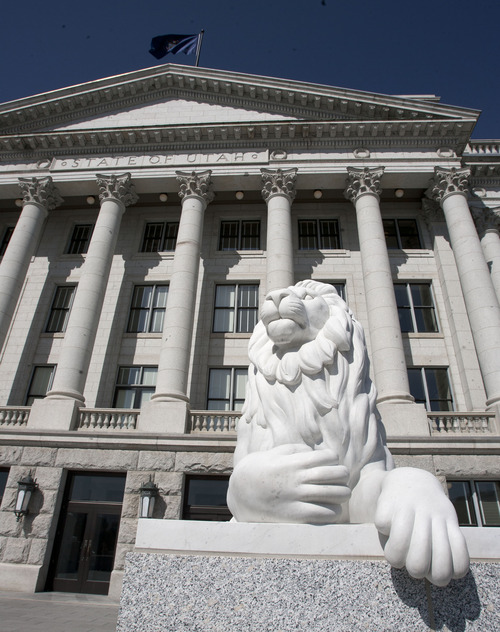This is an archived article that was published on sltrib.com in 2014, and information in the article may be outdated. It is provided only for personal research purposes and may not be reprinted.
A hijacking of sorts occurred in the Utah Senate Tuesday.
Senators approved taking perhaps hundreds of millions of dollars that were targeted to help equalize funding for schools around the state over the next four years, and earmarked it instead for a drive pushed by House Speaker Becky Lockhart to put more technology in schools.
Lockhart was surprised by the move, and said she views it as a property tax hike that she opposes. She would rather have funding come from transportation, which the senator behind the "hijacking" says he wants to protect. It comes as the House and Senate are negotiating the annual budget.
The Senate amended SB111then approved it on a 16-12 vote. It now goes to the House.
"I think this stinks," said Sen. Pat Jones, D-Holladay.
Sen. Jim Dabakis, D-Salt Lake City, added he already was not excited about a bill that essentially played Robin Hood to take property tax from some rich school districts to help poor ones. But now "it is going to be used on a wild experiment in buying up iPads for every student."
Sen. Aaron Osmond, R-South Jordan, initially sponsored SB111 to even out differences in funding from property tax between school districts in the state, which he said has put students in poorer areas at a disadvantage.
Some districts have relatively low property tax rates but collect a lot of money because they are in wealthy areas, Osmond has said, whereas others have relatively high rates but collect little money because they're in poorer areas.
His bill would raise money for equalization by freezing a state property tax rate — known as the minimum basic tax rate. Currently, that rate goes down as property values rise. Keeping the rate constant would allow more money to be collected as property values rise.
Fiscal analysts predict that would raise $12 million the first year, $41 million the second year, rising eventually to $100 million a year — where it would be kept to equalize funding.
But Sen. Howard Stephenson, R-Draper, amended the bill so that for the first four years, money from that tax increase would go instead for the effort to put technology in schools — if that passes separately in HB131. It envisions eventually having one computer tablet for every student in public schools.
"If we were to do that in the scale envisioned in HB131, it would essentially require transportation funds and the use of significant other education funds making it hard to keep some of the programs going that are on our funding list," Stephenson said.
He said his change would "enable the Legislature to fund HB131 without robbing from other programs," except perhaps school equalization — which itself was described by critics as attempting to rob from the rich to help the poor.
Osmond remarked on the "unique politics going on right now relative to our budget." While he said he would prefer the money go for his original intended purpose, he did not oppose the amended version — saying after four years the money would go again for equalization.
"I feel this is an end run," Jones complained. "I don't see why our citizens should be expected to raise their property taxes over the next several years under the guise of equalization and have it go into one area of technology."
Sen. Lyle Hillyard, R-Logan, said the taxes coming are actually so small most homeowners won't notice them, and "it's a step we need to take."
Lockhart said later she did not know the Senate would make such a move, and opposes it.
"In my opinion it is a property tax increase, and I find it interesting that the Senate would support a property tax increase when there are other places in the budget to find money to fund education. If public education is our highest priority, then we will be able to find the money in other places," she said.
For example, she said she would rather fund her drive out of transportation money — one of the areas Stephenson said he worried could be hurt by the technology initiative.
"We've been very good to transportation through the years. We believe that there is revenue in transportation that we can redirect into public education that will not materially affect the transportation program in any kind of significant way that would cause problems," Lockhart said.
She noted that the House and Senate are in budget negotiations, and hinted that Tuesday's surprise action could be a strategic move by the Senate as talks move forward.



